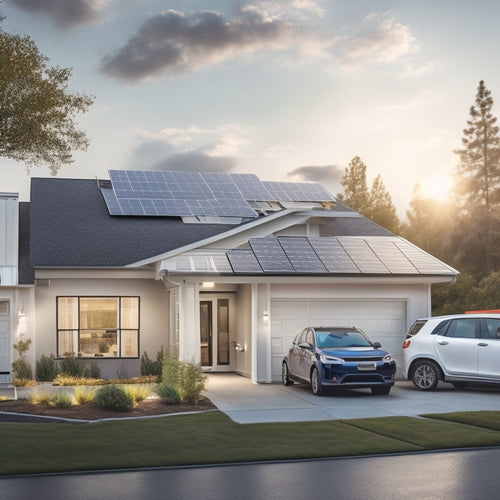
Solar Power Is the Future for Houses
Share
You're investing in a cleaner, more sustainable future by utilizing the power of sunlight, and it's a decision that will change the way you think about energy for your home. With solar power, you'll reduce your reliance on fossil fuels, minimizing your carbon footprint and contributing to a cleaner environment. You'll also reap cost savings over time, thanks to government incentives, lower energy bills, and increased property value. As technology continues to advance, you'll benefit from even greater efficiency and control, ultimately becoming less reliant on traditional power grids. Now, explore the specifics of how solar power can work for your home.
Key Takeaways
- Solar power offers a clean and renewable energy source, reducing reliance on fossil fuels and mitigating climate change.
- Advances in technology increase efficiency and decrease costs, making solar power a more viable option for homeowners.
- Government incentives and tax credits offset initial installation expenses, leading to long-term financial benefits.
- Solar panels can be integrated with smart home systems, enabling real-time energy monitoring and control.
- Energy storage solutions allow homeowners to utilize excess energy during power outages, promoting energy independence.
The Benefits of Solar Energy
In utilizing the power of the sun, you release a plethora of benefits that can change the way you live. By tapping into solar energy, you access a clean and renewable source of power that reduces your reliance on fossil fuels. This, in turn, minimizes your carbon footprint and contributes to a healthier environment.
Moreover, solar energy incentives offered by governments and institutions can greatly offset the initial investment costs, making it a more viable option. The rapid solar technology advancements have also led to increased efficiency and reduced costs, making it more accessible to the masses.
With solar power, you can enjoy lower energy bills, increased energy independence, and a potential increase in your property value. Additionally, solar energy systems require minimal maintenance and can last for decades, providing a long-term solution to your energy needs.
Solar Panels for Home Use
Frequently, homeowners considering solar power for their houses focus on the installation of solar panels, which are an important component of any residential solar energy system.
You're likely wondering what makes these panels so vital. The answer lies in their ability to convert sunlight into electrical energy. When selecting solar panels for your home, you should prioritize high solar panel efficiency, as it directly impacts the amount of power generated. Look for panels with efficiencies ranging from 15% to 20% or higher.
The installation process typically begins with a site assessment to determine the best panel placement. Next, a racking system is installed to secure the panels to your roof.
Then, the panels are connected to an inverter, which converts DC power into usable AC power for your home. Finally, the system is connected to the grid, allowing you to feed excess energy back into the system and offset your energy bills.
Cost Savings Over Time
By utilizing the power of solar energy, you can greatly reduce your reliance on traditional energy sources and enjoy substantial cost savings over time.
While there are initial installation expenses associated with solar panels, these costs are markedly outweighed by the long-term savings.
-
You'll see a reduction in your monthly energy bills, as solar power generates free energy for your home.
-
You'll also benefit from increased property value, as solar panels are a desirable feature for potential buyers.
-
Additionally, many governments offer incentives and tax credits for homeowners who invest in solar energy, further offsetting the initial installation costs.
Environmental Impact of Solar
The environmental impact of solar power is an important aspect to take into account when deciding to shift to clean energy.
As you consider utilizing solar energy, you're not only reducing your reliance on fossil fuels but also contributing to environmental sustainability.
By switching to solar power, you'll greatly decrease your carbon footprint, which is a vital step in combating climate change.
Solar energy is a renewable resource that offers numerous ecological benefits, including pollution reduction.
When you choose solar power, you're investing in a cleaner, healthier environment for future generations.
The Future of Home Energy
As you gaze out at the rooftops in your neighborhood, nearly every house is still connected to the traditional power grid, reliant on fossil fuels that pollute the air and harm the environment.
But you're about to change that. You're going to be part of the revolution that alters the future of home energy.
With solar power, you'll be utilizing the cleanest, most abundant energy source available.
And with advancements in technology, it's becoming more efficient and cost-effective than ever.
Here's what you can expect:
- Smart home integration: Seamlessly connect your solar panels to your home's energy management system, allowing you to monitor and control your energy usage in real-time.
- Energy storage: Store excess energy generated during the day for use at night or during power outages, ensuring you're always powered up.
- Increased energy independence: Reduce your reliance on the grid and enjoy the freedom that comes with generating your own clean energy.
Get ready to take control of your energy future and join the solar power revolution.
Frequently Asked Questions
Can I Install Solar Panels on a Rented Property?
Will you be able to utilize the power you crave? It's possible, but you'll need to secure solar panel agreements and obtain landlord permissions before installing on a rented property, ensuring a harmonious and profitable arrangement for all parties involved.
How Do I Store Excess Energy Generated by Solar Panels?
You'll need energy storage solutions to capture excess energy generated by your solar panels; consider battery options like lithium-ion, lead-acid, or flow batteries, each with varying capacities, lifespans, and costs, to optimize your energy storage needs.
Do Solar Panels Require Frequent Cleaning and Maintenance?
Your solar panels are like a well-oiled machine, but they still need regular tune-ups! You'll want to clean them every 6-12 months to guarantee peak energy absorption, and perform routine maintenance checks to prevent damage and enhance performance.
Can I Use Solar Power for Heating My Home's Water?
You can opt for solar water heaters, which utilize sunlight to heat water, reducing energy bills. Installation costs vary, but they're often offset by long-term savings and incentives, making solar-powered water heating a cost-effective, eco-friendly choice for your home.
Are There Any Government Incentives for Solar Panel Installation?
You'll be interested to know that, in 2020, the US saw a 43% increase in solar panel installations. You can benefit from federal tax credits, which cover 26% of installation costs, and state rebates, which vary, making solar panel installation more affordable.
Related Posts
-

Waterproofing Solar Panels for Vehicles: A Step-by-Step Guide
When waterproofing solar panels for your vehicle, start by evaluating your energy requirements and selecting the righ...
-

What Electric Vehicle Owners Need for Home Energy
As an electric vehicle owner, you need to optimize your home energy system to guarantee efficient, sustainable, and c...
-

Eco-Friendly Car Battery Solutions Available Online
You can now shop online for eco-friendly car battery solutions that not only reduce your carbon footprint but also of...


